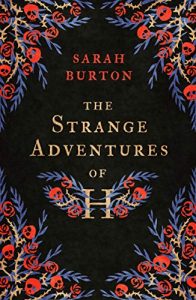Tips On Writing Historical Fiction

I’ve been teaching creative writing for years, but continue to learn things I didn’t know about writing both from my students’ work and from my own writing experiences. This year saw the publication of my first novel, The Strange Adventures of H; it was also my first attempt at historical fiction and once again I learnt a shedload of lessons. That novel was set during the 1660s; the novel I am just starting is set during the Second World War, and I’ve been thinking: what did I gain during the writing of H that would help me approach this new subject?
So here’s my advice to myself, which might be helpful to you if you are embarking on historical fiction:
Don’t panic about the amount of research you’re going to have to do.
You don’t have to know everything about everything in your historical period. Your story occupies only parts of that world, and those are the parts you have to know a lot about. In my new book (I haven’t got a title so let’s call it The Evacuee for now) I will need to know the main events of the war as they affect my character rather than the finer points of the campaign in North Africa. That will be detail about the lives of evacuees and a timeline only for world events that touch and affect the story.
Keep it real.
One of the things many readers like about H is how real the world of the book feels. This is because I read lots of first-hand accounts written at the time (especially during the plague of 1665 and the great fire of 1666) – diaries, journals, letters, essays – to get a sense of everyday life. When approaching the Second World War I’ve got the benefit of films and music from that period too. Immersing myself in the detail of that world will help give me a real feel for ‘being there’. This familiarity with the social history of a period matters much more than the kind of Kings and Queens history a lot of us learnt at school. Think how little it matters, in a modern novel set in the twenty-first century, who’s the president or the prime minister: the novel’s interest usually lies in the lives and immediate circumstances of the characters – and it’s exactly the same with historical fiction.
Don’t be a slave to truth but develop a sense for what feels right.
While of course it’s hugely important to avoid anachronisms or errors which will weaken the reader’s trust in you as a storyteller, you often have to bend the truth in order to make your story work. This is especially true with dialogue. If you write your dialogue in a way that is absolutely accurate for your period your readers may need to have a dictionary at hand and regularly consult it for unfamiliar vocabulary – this would certainly have been the case if I’d written the dialogue in H as people really spoke in the late seventeenth century. You have to arrive at a compromise so that the language feels authentic, without being incomprehensible.
This will be easier in The Evacuee but in a sense the closer a period is to our own the more likely we are to ignore how very different everyday life really was. Most people in my new book won’t have telephones, TVs, cars. Letters, telegrams, trains and the radio will be much more important than they are today. These factors will not only affect the details in the story but how the story is told. As long as you are picturing the historical world of your story you can make good decisions about how your story unfolds.
Don’t fall in love with your research.
Because research can be so enthralling, it can take you a long way from the needs of your own story. In early drafts of ‘H’ I included loads of fascinating detail about the theatre of the time – not noticing that I had effectively ‘parked’ the story while I regaled the reader with all this interesting stuff. It’s very easy to fall in love with your findings and include them where they’re not wanted.
This is when you have to look at yourself in the mirror and say: ‘The job of the novelist is to tell the story and research should always serve that imperative before any other.’ On the other hand, it is inevitable that as you research the historical ‘everyday’ you will come across facts which will give you ideas for your story. This is one of research’s great incidental pleasures and can add great value to your book. Just make sure your story is still on the move and hasn’t stalled in order to squeeze in something just because you can’t bear to leave it out.
Wear your research lightly.
Ideally your reader is not aware of research in your book. It should be like punctuation, just helping the story along without really being noticed, or like wallpaper – present but not drawing attention to itself. There is a great temptation to think: ‘I’ve suffered doing all this hard work and I’m going to make damn sure the reader knows it’ – but the reader cares much more about being caught up in a compelling, believable tale; when a detail stands out as RESEARCH you risk breaking the spell.
—
Sarah Burton August 2020
—
Sarah Burton is the author of three works of non-fiction and two books for children. She was founder-director of Cambridge University’s MSt in Creative Writing and has taught at Royal Holloway College, Goldsmiths’ College and the University of Oxford. She currently teaches regularly for the Guardian Masterclass series, as well as for Cambridge University’s Centre for Creative Writing. She has written extensively for BBC History Magazine and has reviewed for the Times, Spectator, Guardian and Independent. THE STRANGE ADVENTURES OF H is her debut novel for adults.
THE STRANGE ADVENTURES OF H
 ‘Full of terrific historical detail… has that sparky confidence and unputdownable quality.’
‘Full of terrific historical detail… has that sparky confidence and unputdownable quality.’
Alison Pearson, judge for the Lucy Cavendish Fiction Prize
‘This book is well written and the narrator, in whichever guise, is engaging… a very readable, interesting… exciting book, which I am happy to recommend’
Historical Novel Society
Orphaned young, H is sent to live with her doting aunt in London. H’s life is a happy one until her lecherous cousin robs her of her innocence, and the plague takes away the city and the people she loves. H is cast out – friendless, pregnant and destitute – into the rapidly emptying streets of London under quarantine.
Forced to fend for herself, she is determined to gain back the life she lost. H will face a villain out for revenge, find love in the most unexpected places, and overcome a betrayal that she never could have foreseen. Weathering it all, can H charm, or scheme, her way to the life of freedom and independence that she longs for?
‘This is a wonderfully put together story that I easily lost myself in, having well and truly caught my attention from the first few pages.’ Laura Patricia Rose
‘If you enjoyed Tipping the Velvet by Sarah Waters and are looking for a new fast-paced historical fiction novel to read, this one may be for you.’ @this.literary.queendom
‘A gripping and genuinely interesting story to read’ @amandallwyd
‘The story-telling is very evocative… great original storyline’ @books_and_lovely_things
‘H is a feisty, determined and captivating heroine… a must read’ @otterly_bookish
‘A remarkably poignant and timely read’ @e.f.paterson
‘I have truly enjoyed this treat of a read, captivating and beautifully written with wonderful characters.’ @BooksandEmma
‘I couldn’t put this book down’ @noveldelights
BUY HERE
Category: Contemporary Women Writers, How To and Tips

























Was looking for some takes regarding this topic and I found your article quite informative. It has given me a fresh perspective on the topic tackled. Thanks!
Please check out also my blog, relevant to yours:Tips and Tricks in Writing a Fiction Based on True Events
Have a nice day!